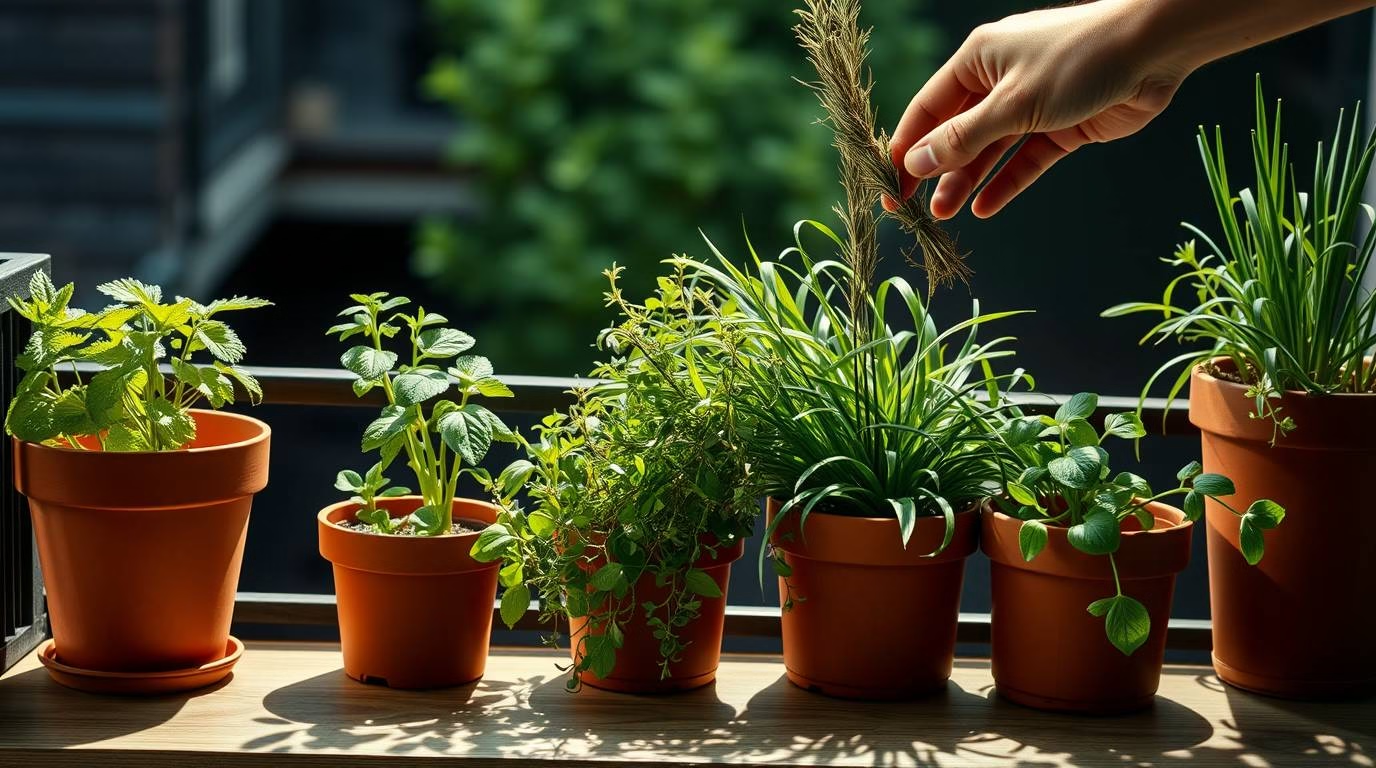Imagine stepping onto your balcony and picking fresh, fragrant basil for your pasta, or snipping some mint for your afternoon tea. The idea of growing your own herbs might seem daunting if you don’t have a big backyard, but the truth is, all you need is a little space, some sunshine, and a few simple tips. Balcony gardening is a rewarding and incredibly accessible hobby, especially for those just starting out. It’s a chance to connect with nature, enjoy fresh flavors, and add a touch of green to your urban life.
Table of Contents
- Your Balcony: The Perfect Herb Garden!
- Why Balcony Gardening is a Great Starting Point
- Sun Assessment – Your Most Important First Step
- Choose Your Herb Heroes (The Easiest to Grow)
- Pick the Perfect Pots (Space-Saving Solutions)
- Get Your Soil Right (It’s Easier Than You Think)
- Planting Your Seeds or Seedlings
- Watering & Feeding (The Golden Rules)
- Harvesting & Maintenance (Enjoying the Fruits of Your Labor)
- Common Beginner Questions & Troubleshooting
- Conclusion: Savor the Flavor of Your Own Garden!
- Further Reading
I’ve learned firsthand that you don’t need a green thumb to succeed. It’s all about choosing the right herbs, understanding the basics, and setting up your space efficiently. This guide is packed with easy balcony gardening tips for beginners, designed to take the guesswork out of the process. We’ll walk through everything from picking the right plants to watering them properly, ensuring your first foray into gardening is a delicious and successful one. So, if you’re ready to transform your small space into a thriving herb sanctuary, let’s get planting!
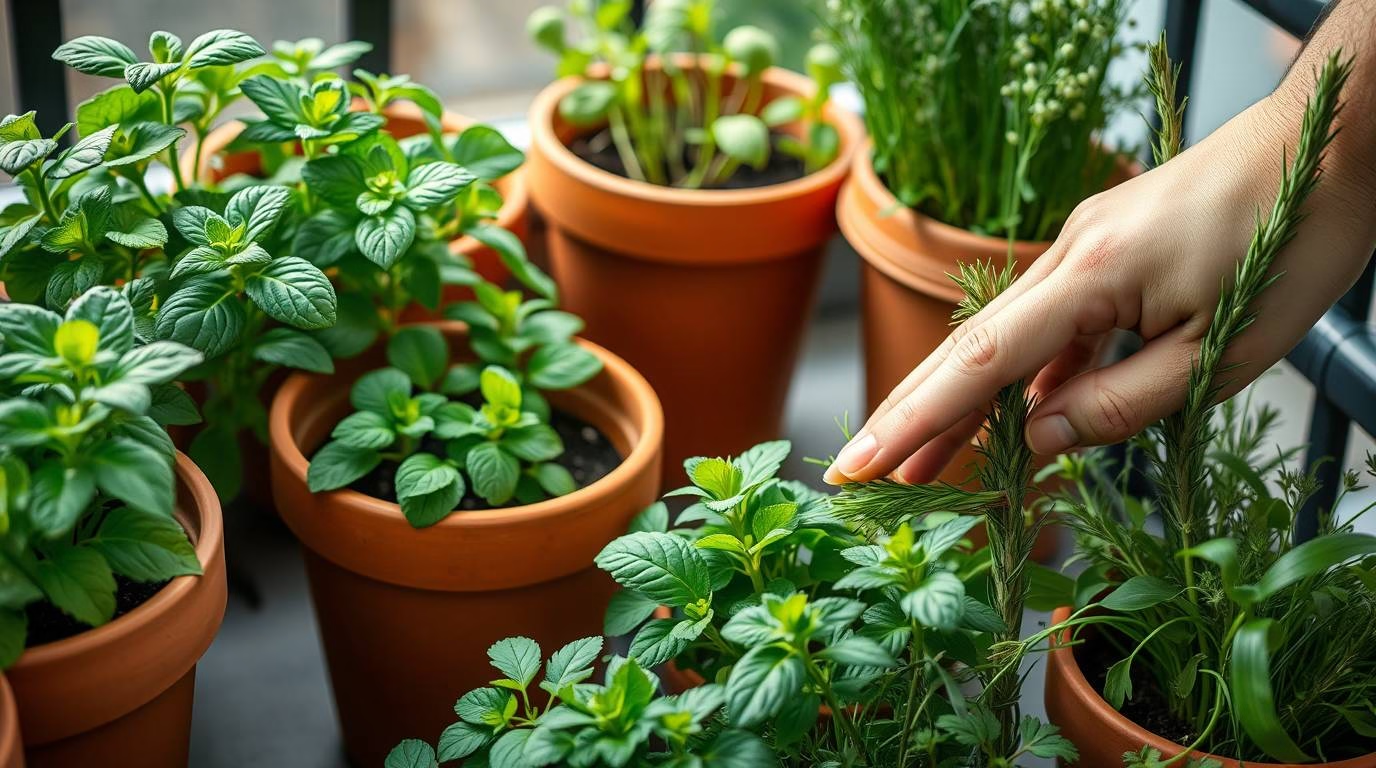
Your Balcony: The Perfect Herb Garden!
A balcony, no matter how small, is an ideal spot for a budding gardener. It’s a controlled environment that offers a great starting point for growing your own herbs.
- Controlled Space: Unlike a large yard, a balcony allows you to manage everything on a smaller scale. You can easily control the soil, watering, and light, which reduces the chance of things going wrong. This is a huge benefit for anyone looking for easy balcony gardening tips for beginners.
- Convenient Access: Your garden is just a step away from your kitchen. The convenience of fresh herbs right outside your door makes a huge difference, encouraging you to use them more often in your cooking and saving you trips to the store.
- Aesthetic Appeal: A well-tended balcony herb garden adds a touch of life, color, and wonderful scents to your outdoor space. It makes your home feel more vibrant and connected to nature.
- Perfect for Herbs: Herbs thrive in containers, making them the perfect choice for a balcony. They don’t need deep roots or vast amounts of soil, so they’re well-suited to the confined space.
By embracing your balcony’s potential, you’re well on your way to mastering these easy balcony gardening tips for beginners and enjoying a rewarding new hobby.
Why Balcony Gardening is a Great Starting Point
For anyone new to gardening, a small-scale balcony garden offers a low-risk, high-reward experience. It’s a fantastic way to build confidence and learn the fundamental skills of plant care without feeling overwhelmed.
- Low Maintenance: With a small number of pots, watering and fertilizing are quick and simple tasks. You can easily monitor your plants’ health and spot any issues before they become serious.
- Experimentation: A balcony garden gives you the freedom to experiment with different herbs and growing methods without a major commitment. If a plant doesn’t thrive, you can easily replace it and try something new.
- Minimal Investment: You don’t need expensive equipment or a large budget to get started. A few pots, some soil, and a pack of seeds are all you need to begin your journey. A simple kit, like the Planters’ Choice Herb Growing Kit, includes everything to get you started.
- Quick Results: Many herbs grow relatively quickly. You’ll be able to see the fruits of your labor in a matter of weeks, which is incredibly motivating for new gardeners.
By starting small, you can learn the basics, see tangible results, and build a green thumb without the stress of a large-scale garden. It’s the perfect introduction to the world of gardening.
Sun Assessment – Your Most Important First Step
Before you buy a single plant or seed, the most important of all easy balcony gardening tips for beginners is to understand your balcony’s sun exposure. All plants need light, but different herbs have different needs.
- Be a Sun Detective: Spend a full day observing your balcony. Where does the sun hit in the morning? In the afternoon? How many hours of direct sunlight does it get? A few hours of observation will give you all the information you need.
- Full Sun (6+ hours): If your balcony gets direct sun for most of the day, you can grow sun-loving herbs like basil, thyme, oregano, and rosemary.
- Partial Sun (3-6 hours): This is great for herbs like parsley, chives, mint, and cilantro, which can tolerate some shade, especially from the hot afternoon sun.
- Shade (less than 3 hours): Even with minimal sun, you can still grow a few herbs. Mint, parsley, and chives are your best bets, as they are very forgiving.
- Rotate Your Pots: If your balcony has different sun exposures throughout the day, you can rotate your pots to give each plant its share of the sun. This simple trick is a game-changer for anyone trying to maximize their space with these easy balcony gardening tips for beginners.
Knowing your sun exposure will help you choose the right herbs for your space, setting you up for success from the very beginning.
Choose Your Herb Heroes (The Easiest to Grow)
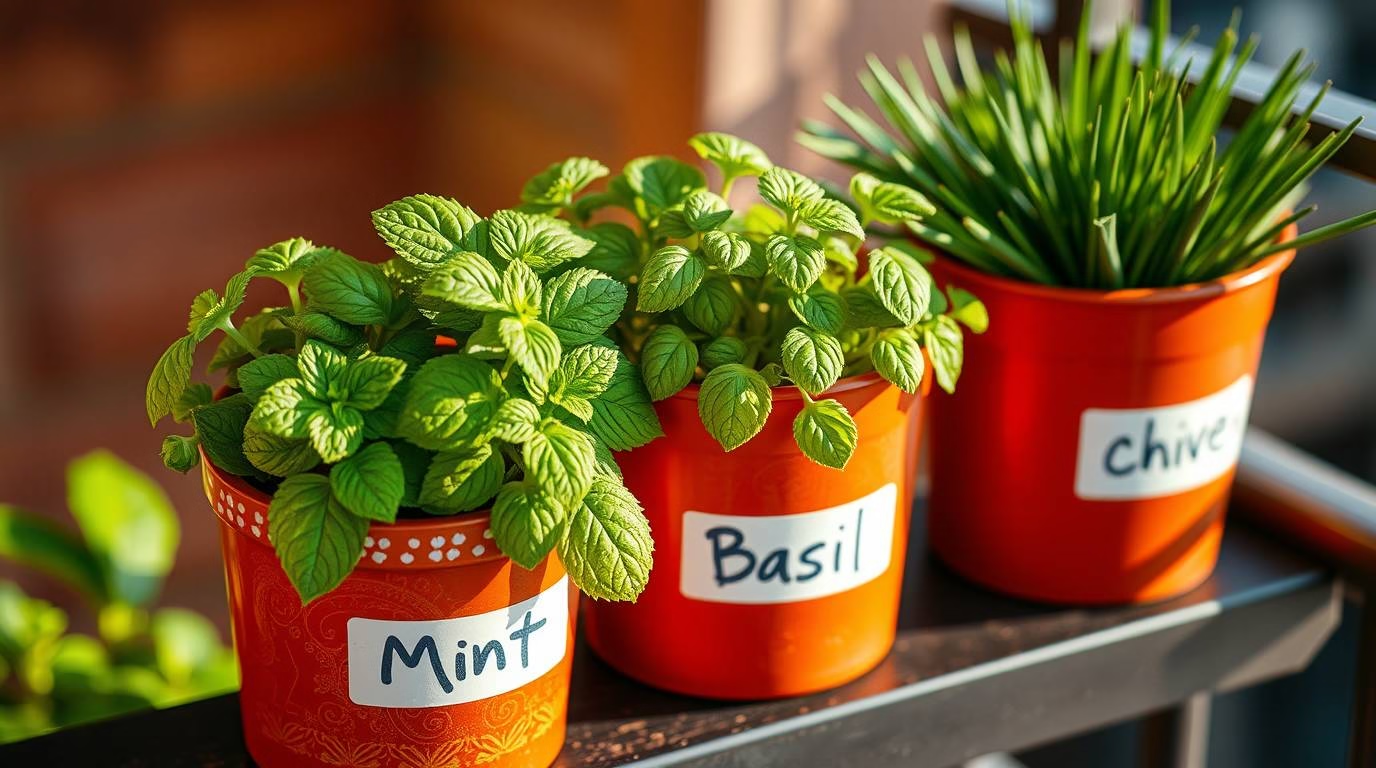
As a beginner, you want to start with herbs that are known to be resilient and forgiving. Choosing these “herb heroes” is a crucial part of these easy balcony gardening tips for beginners.
- Mint: A beginner’s dream! Mint grows like a weed and is very hard to kill. It thrives in partial sun and loves water. Pro Tip: Plant mint in its own pot, as it can be very invasive and take over other plants’ space.
- Basil: A sun-lover that is perfect for balcony gardens. You’ll get to enjoy its fresh leaves in a matter of weeks. The more you harvest, the more it grows!
- Chives: These perennial herbs are perfect for beginners. They’re hardy, low-maintenance, and grow back year after year. They can tolerate a variety of light conditions.
- Thyme & Oregano: Both are tough, Mediterranean herbs that love sun and well-draining soil. They are perfect for hanging planters or small pots. They are also drought-tolerant once established.
- Rosemary: Another hardy, sun-loving herb that is very forgiving. It doesn’t need a lot of water and thrives in warm conditions.
By starting with these easy-to-grow herbs, you’ll see quick results and build the confidence to expand your garden in the future.
Pick the Perfect Pots (Space-Saving Solutions)
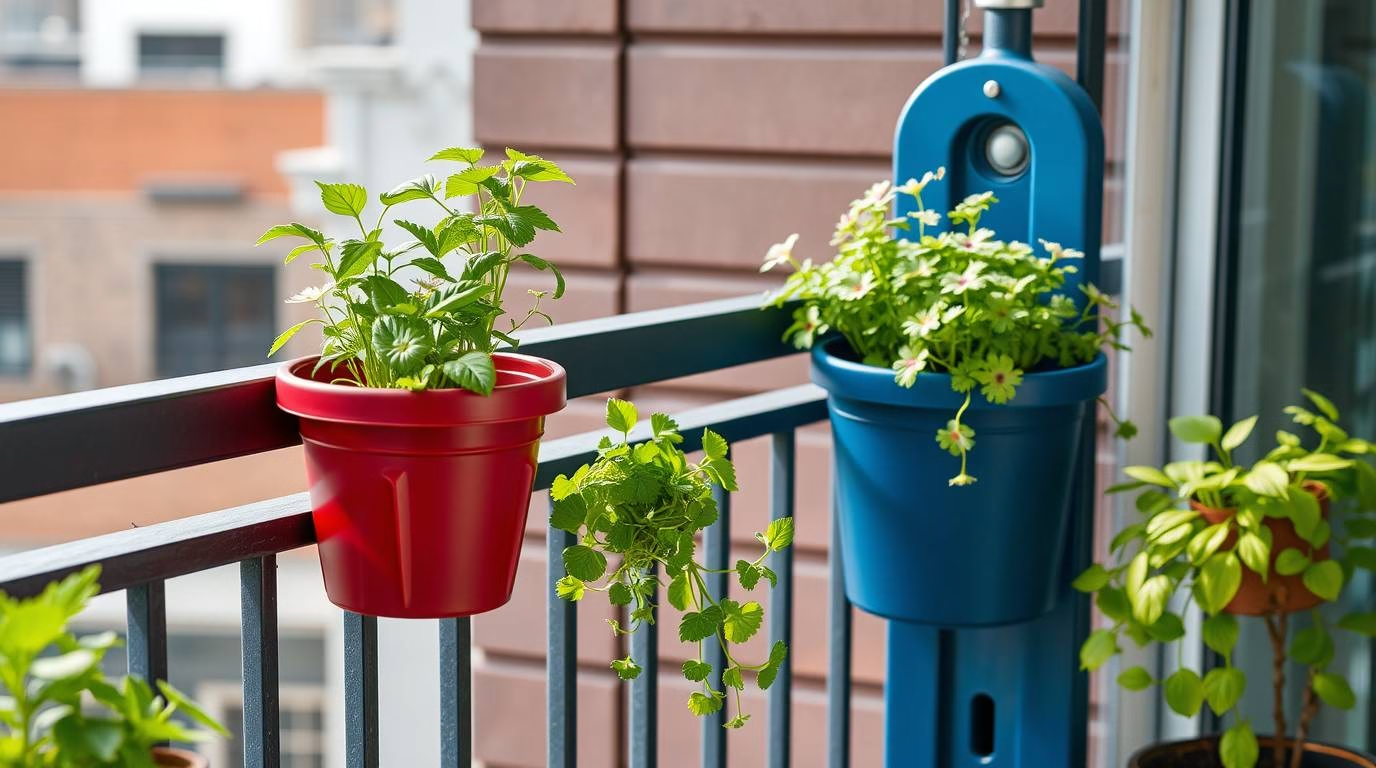
Choosing the right containers for your herbs is essential for a small space. This step is about maximizing your balcony’s potential with these easy balcony gardening tips for beginners.
- Don’t Go Too Small: While you might be tempted to use tiny pots, they dry out quickly and don’t give roots much room to grow. A pot that’s at least 6-8 inches in diameter is a good starting point for most herbs.
- Drainage is Key: No matter what pot you choose, make sure it has drainage holes at the bottom. This prevents your plants from getting waterlogged and developing root rot. If a pot doesn’t have holes, you can easily drill a few yourself.
- Vertical Planters: These are a game-changer for a small balcony. They allow you to grow multiple herbs in a small footprint by utilizing vertical space. A wall-mounted or stacked planter is a great solution. Check out the Artpce 5 Tier Vertical Garden Planter.
- Rail Planters: These clever planters hook onto your balcony railing, using space that would otherwise go unused. They’re perfect for sun-loving herbs.
- Self-Watering Planters: If you’re a beginner who worries about over or under-watering, a self-watering planter can be a lifesaver. It has a reservoir at the bottom that provides a steady supply of water to your plants. The Gardener’s Supply Company Self-Watering Planters are great for this.
By selecting the right pots and thinking vertically, you can create a beautiful and functional herb garden even on the smallest balcony.
Get Your Soil Right (It’s Easier Than You Think)
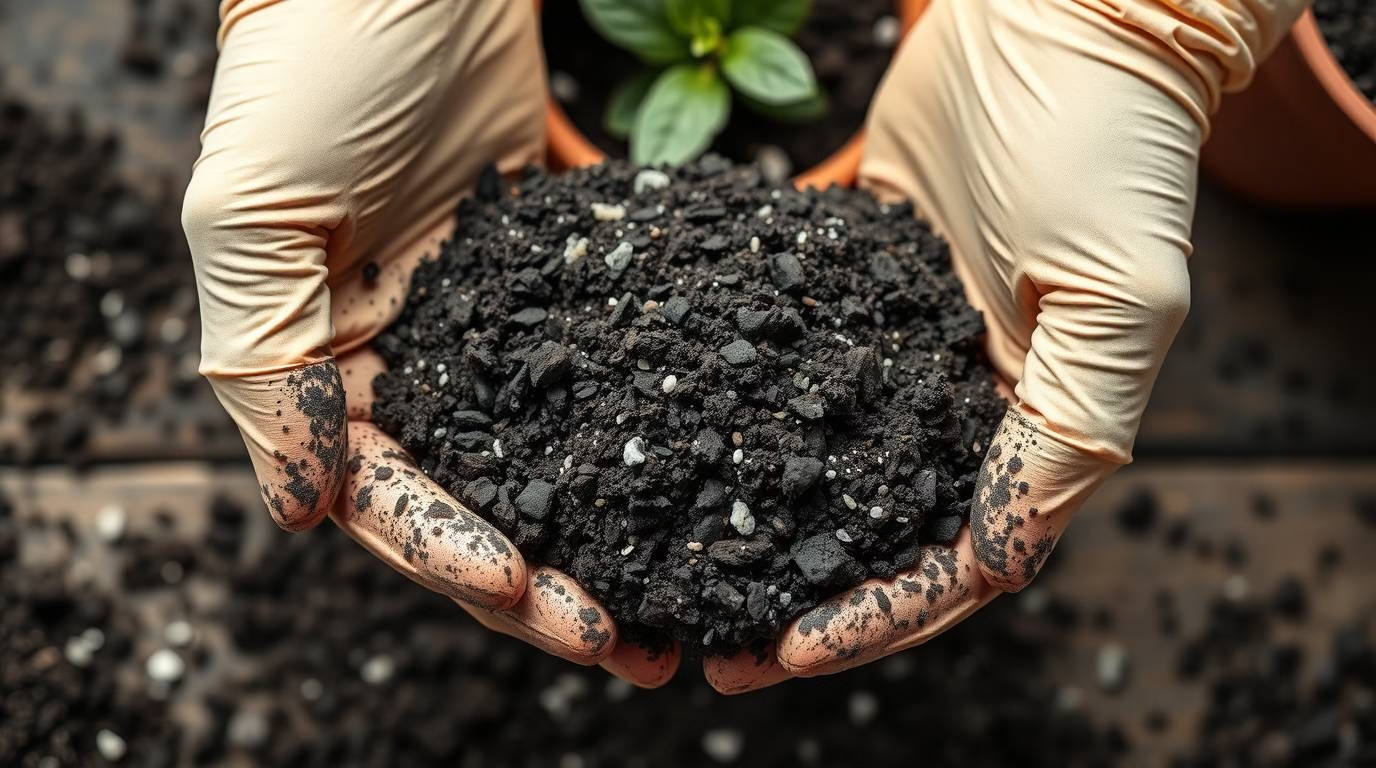
For a beginner, the thought of choosing the right soil can be intimidating, but it’s actually quite simple. The most important thing is to use the right type of soil for containers.
- Don’t Use Garden Soil: Soil from your yard is too dense and can compact in a container, preventing proper drainage and airflow. It may also contain pests or diseases.
- Choose a High-Quality Potting Mix: This is the best option for a balcony herb garden. Potting mix is light, airy, and designed to provide the perfect balance of drainage and moisture retention for container plants. Look for a mix that is specifically labeled for “containers” or “potted plants.”
- Add Perlite for Extra Drainage: To make your soil even better, you can mix in a handful of perlite (the little white balls) to the potting mix. This will improve drainage and aeration, which herbs love. Miracle-Gro Potting Mix is a reliable choice for beginners.
- Layering for Drainage: To further ensure good drainage, you can place a few small stones or a piece of a broken terracotta pot at the very bottom of your container before adding the soil.
By using the right potting mix, you’ll give your herbs the best possible start and ensure they have a healthy foundation to grow.
Planting Your Seeds or Seedlings
Once you have your pots and soil, it’s time to get your hands dirty! You have two options for starting your herbs: seeds or seedlings.
- Seeds:
- Pros: They are very affordable, and you get to watch your plants grow from the very beginning.
- Cons: They take longer to grow and require a bit more patience and care to get started.
- How to Plant: Fill your pot with soil, leaving about an inch of space at the top. Read the seed packet for specific planting depth and spacing. Gently water the soil and keep it moist. You’ll likely need to thin out the seedlings once they grow a bit to give them room.
- Seedlings (Starter Plants):
- Pros: They are already started and ready to go. You get a head start and can enjoy your herbs much sooner.
- Cons: They are more expensive than seeds.
- How to Plant: Gently remove the seedling from its plastic container. Be careful not to damage the roots. Place the seedling in the new pot at the same depth as it was in the original container. Fill the pot with soil around the plant, pressing down gently. Water it thoroughly to help it settle in. A small garden trowel, like the Edward Tools Trowel, can make this process a breeze.
For a true beginner, starting with seedlings is often the most rewarding route, as you’ll see quick success and can get to harvesting sooner.
Watering & Feeding (The Golden Rules)
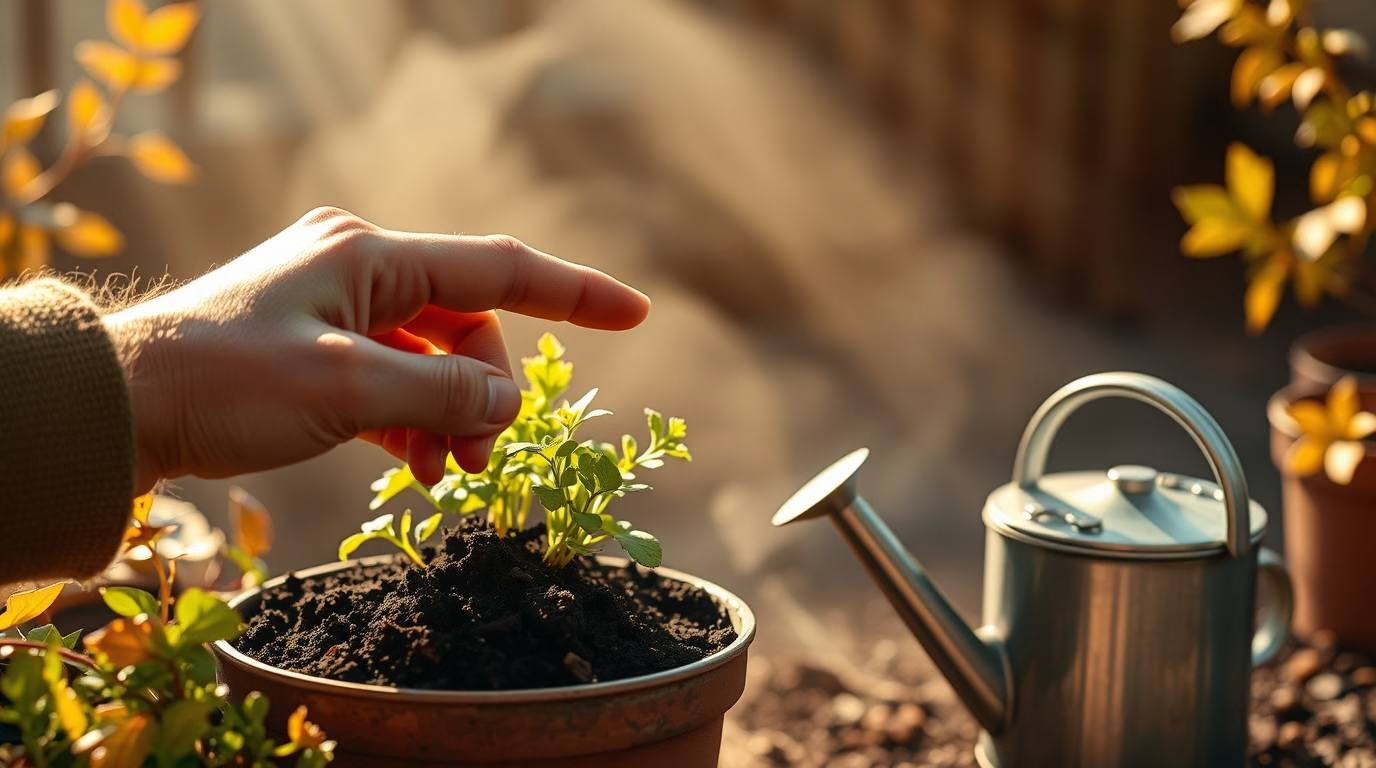
This is one of the most common stumbling blocks for beginners, but it’s easy to get right with a few simple rules. Getting the watering right is an essential part of these easy balcony gardening tips for beginners.
- Water Less, Not More: It’s a beginner’s mistake to over-water plants. Too much water can lead to root rot. Instead of watering on a schedule, water when the plant needs it.
- The Finger Test: The best way to tell if your plant needs water is to stick your finger about an inch into the soil. If the soil feels dry, it’s time to water. If it feels moist, wait another day.
- Water Deeply: When you do water, do it thoroughly until water starts to drain out of the bottom of the pot. This ensures the roots get a good soak.
- Water the Soil, Not the Leaves: Aim your watering can directly at the base of the plant. Wet leaves can lead to fungal diseases.
- Feeding Your Herbs: Herbs in containers need to be fed, as they use up the nutrients in the soil. A good potting mix will provide nutrients for the first few months. After that, you can use a diluted liquid fertilizer every few weeks. Look for a fertilizer specifically for herbs, like Espoma Organic Herb Food.
By following these simple watering and feeding tips, you’ll keep your herbs happy and healthy throughout their growing season.
Harvesting & Maintenance (Enjoying the Fruits of Your Labor)
The best part of growing your own herbs is getting to use them! Proper harvesting techniques will not only give you fresh herbs but also encourage your plants to grow bigger and bushier.
- Don’t Be Shy: Don’t be afraid to harvest your herbs! The more you snip, the more the plant will grow. This is especially true for herbs like basil and mint.
- The 1/3 Rule: Never harvest more than one-third of the plant at a time. This ensures the plant has enough leaves to continue photosynthesizing and growing.
- Snip from the Top: For herbs like basil and mint, snip just above a set of leaves. This encourages the plant to branch out and become bushier.
- Remove Flowers: For most herbs, you want to snip off any flower buds that form. When a plant flowers, it puts all its energy into producing seeds, and the leaves can lose their flavor. Pinching off the flowers keeps the energy focused on the leaves.
- Pest Watch: Keep an eye out for common pests like aphids. If you see any, you can spray the plant with a gentle stream of water or a simple solution of water and a few drops of dish soap.
By properly harvesting and maintaining your plants, you’ll enjoy a steady supply of fresh herbs all season long.
Common Beginner Questions & Troubleshooting
Even with the best easy balcony gardening tips for beginners, you’re bound to have a few questions. Here are some common ones and their simple solutions.
- Why are my leaves turning yellow? This is usually a sign of either over-watering (the most common cause) or under-watering. Check the soil with the finger test (see Step 6).
- My plant looks droopy and sad! This is often a sign of thirst. Give it a good, deep drink of water.
- My plant is tall and leggy, not bushy! This is a sign it’s not getting enough sun. Try moving it to a sunnier spot or rotating it more often.
- What if my balcony gets too hot? In very hot climates, you can place your plants on a cart with wheels and move them to a shadier spot during the hottest part of the day. You can also use a small shade cloth to give them a break.
- Can I grow herbs indoors? Yes! Many herbs can be grown on a sunny windowsill. Just be sure to rotate them to ensure all sides get some light.
These quick troubleshooting tips will help you address most common issues, keeping your garden thriving.
Conclusion: Savor the Flavor of Your Own Garden!
Starting a balcony herb garden is a simple, affordable, and incredibly rewarding way to bring fresh flavor and natural beauty into your life. By following these easy balcony gardening tips for beginners, you’ve learned to assess your sun, choose the right herbs, and master the basics of planting and care.
Remember to start small, be patient, and don’t be afraid to experiment. Soon, you’ll be enjoying the fruits of your labor and adding a fresh, homegrown touch to every meal. Your balcony isn’t just a small space; it’s a potential garden waiting to bloom. Happy planting!
Don’t want to miss our next article? Follow us on social media! And while you’re here, why not explore more great articles on our blog for even more easy life tips!
Further Reading
- How to Plant Herbs in Pots: Which Herbs Go Together
- Grow These 13 Herbs in Pots for a Fragrant Garden Almost Anywhere
- How to grow herbs
Affiliate Disclosures
This post may contain affiliate links, which means we may receive a commission if you make a purchase through these links, at no extra cost to you. As an Amazon Associate, we earn from qualifying purchases. This helps support our blog and allows us to continue sharing easy life tips with you!

